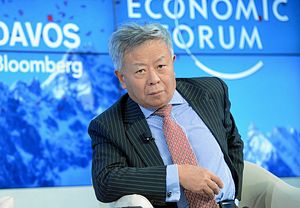Since its doors officially opened for business in mid-January with the first meeting of its board of governors, the China-led Asian Infrastructure Investment Bank (AIIB) has been quick to get down to business. The development bank, the newest on the scene in Asia and a friendly competitor to the Asian Development Bank (ADB) and the World Bank, is looking to get its first loans off the ground to support infrastructure development across Asia.
Since opening its doors, the AIIB has notably made important senior appointments to its top leadership. Jin Liquin, the bank’s inaugural president, welcomed five vice presidents to the bank in early February. Danny Alexander, Kyttack Hong, D.J. Pandian, Joachim von Amsberg, and Luky Eko Wuryanto joined the bank’s top ranks.
Alexander headed the United Kingdom’s treasury as chief secretary from 2010 to 2015 and joins the bank as the vice president and chief risk officer. Hong is the former chief executive officer of the Korea Development Bank and joins the AIIB as chief risk officer. Pandian comes to the bank for the Indian Administrative Service and is the AIIB’s chief investment officer. Von Amsberg left the World Bank to join the AIIB as vice president for policy and strategy. Finally, Wuryanto comes to the AIIB as chief administration officer, leaving the Indonesian government.
Jin, a former vice finance minister in the Chinese government, said that the five vice presidents were “an exceptionally strong and committed group who will bring wide and varied experience and a wealth of expertise that will serve the bank well.”
Where the AIIB decides to put its capital to work will be of great interest to the international community. In particular, the United States and Japan, two notable states with stakes in the World Bank and ADB that have chosen not to join the AIIB. The first projects sponsored by the AIIB will demonstrate if Tokyo’s and Washington’s concerns about the bank’s operations are realistic or unfounded.
The bank has to date not publicly hinted at specific loan requests under consideration, but resolved to differentiate itself from the ADB and World Bank by making its financing solely on economic considerations, leaving aside “the political character of the member concerned.” The AIIB’s Articles of Agreement, which were signed by its founding members late last year, emphasize and enshrine this principle.
Following the bank’s launch in January, Jin told the press that the AIIB already has a very good pipeline of co-financing projects [with other international development banks] and standalone projects.” He noted that while the AIIB would initially extend financing in U.S. dollars, it would eventually look into using the Euro and Chinese yuan, among other currencies.

































